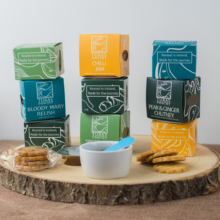Uncertainty Reigns For Key Industry As New Year Looms
The reports that food supplies to Northern Ireland from Great Britain could be adversely impacted due to Brexit from the start of 2021 are deeply worrying. There have been warnings too from major food wholesalers and supermarkets about potential shortages. And there have even been suggestions that major national supermarkets could either pull out of Northern Ireland altogether or reduce products on their shelves.
I hope these fears prove to be unfounded and that trade between Northern Ireland and Great Britain, our biggest single market, continues unfettered, as the UK Government has long promised. The EU Commission has said it takes warnings from supermarkets about Northern Ireland’s food supplies due to Brexit “very seriously”.
As I write this column, the trade talks between the UK and EU have reached a vitally important stage…again. I hope that an acceptable resolution will have been found by the time this magazine appears. The brinkmanship has been very stressful for everyone in the local food industry.
The Commission’s statement came after our first and deputy first ministers wrote to the EU to urge flexibility in the operation of the new Irish Sea border. The Government in London, of course, has long denied that there will be anything likely to inhibit trade. It’s quite clear, however, that there will be additional bureaucracy involved.
As we all have long known, Northern Ireland will stay in the EU single market for goods but the rest of the UK will leave in a few weeks, which means some food products arriving here from Great Britain will need to be checked due to the EU’s strict rules on products of animal origin – meat, milk, fish and eggs.
These products must enter the single market through a border control post where paperwork is checked and a proportion of goods are physically inspected – hence the Port of Belfast’s work on a substantial new ‘border’ post. But who really knows what will happen when 2021dawns?
Supermarkets make a major contribution to the local food industry and, of course, to the wider economy. Our bigger processors have long enjoyed very good business with major retailers here and especially in Great Britain. And dozens of smaller companies are helped on their journey to success in external markets by achieving initial listing here.
Invest NI has done and continues to a tremendous job in promoting our food to supermarket buyers here, in Britain and the Republic of Ireland. A great many local companies have benefited enormously from this support from Invest NI Food and Drink marketing teams here, in London and in the Republic.
The key role played by the bigger retailers wasshowcased last month in the UK Quality Food Awards which saw local companies Finnebrogue Artisan from Downpatrick; Dunbia, Dungannon and Comber’s Mash Direct winning awards for products supplied to the supermarkets including Lidl, the leading German discounter.
Furthermore, Denis Lynn, chairman of Finnebrogue, a leading supplier of innovative nitrite free bacon and ham to the likes of Marks and Spencer, Morrison’s, Tesco, Sainsbury’s and Asda, was named Entrepreneur or the Year 2020 by the Grocer magazine.
Processors which provide meat and some dairy products to deli counters in supermarkets here are likely to be concerned by suggestions that many supermarkets may be set to axe meat, fish and delicounters. Sainsbury’s has already announced plans todo so and shed over 3,000 jobs across the UK.
The retailer has said the closure of the specialist counters is part of efforts to “better reflect customer demand” and will save the business around £60 million. It reflected customer trends towards on-line shopping. Waitrose, on the other hand, has announced plans to expand its deli counters across Britain. Sadly, Waitrose isn’t represented here. The supermarket, however, does buy from our suppliers. We’d hope to see this retailer purchasing much more from local suppliers over the short and long terms.
Any reduction in services by supermarkets could also accelerate the trend among shoppers towards traditional stores such as butchers, fruit and vegetable outlets, delis and smaller grocers that became apparent during the first lockdown. More people than ever before here are now shopping regularly at such stores for convenience and because of the provenance and knowledge they offer.
This trend was backed up recently in a study by Barclays. This showed also showed a growing demand for locally sourced foods among consumers. Those interviewed said that shopping from local specialist stores helped them better understand where the foodsthey are eating come from and are much better for the environment. We’ve seen growth in this sector with delis in particular opening in parts of Belfast and many local towns. These are crucially important in terms of the opportunities they offer to very many of our artisan and smaller producers. And it’s an encouraging growth set to continue in the year ahead.








